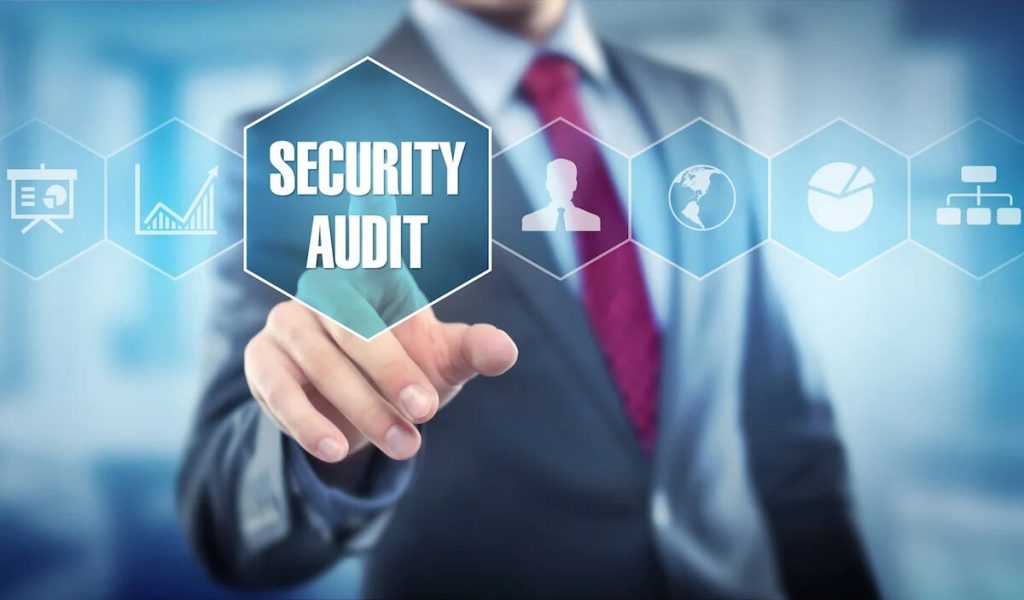
Cyber threats are evolving at an unprecedented pace, making it crucial for businesses to maintain a strong security posture. A single security vulnerability can lead to devastating data breaches, financial losses, and reputational damage.
Regular security audits help organizations identify weak points, ensure compliance, and fortify their defenses against cyberattacks. This article explains what security audits are, why they are essential, and how businesses can conduct them effectively.
What Is A Security Audit?
A security audit is a systematic evaluation of an organization's security policies, procedures, and infrastructure to identify vulnerabilities and ensure compliance with industry standards. These audits assess various aspects of security, including network protection, data integrity, and access controls.
Unlike penetration testing, which focuses on exploiting vulnerabilities to gauge system weaknesses, a security audit provides a broader assessment of overall security posture, ensuring all security measures align with best practices. In an era where digital threats are constantly evolving, understanding cybersecurity in the depths of the deep webis crucial, as hidden cyber risks often originate from the darkest corners of the internet, making thorough audits even more essential.
Why Are Regular Security Audits Important?
1. Preventing Cyber Threats
Hackers continuously develop new methods to exploit system weaknesses. Regular security audits help detect and address vulnerabilities before cybercriminals can take advantage of them. Just like complex puzzles, security threats require careful analysis and strategic solutions to uncover hidden risks and strengthen defenses.
2. Ensuring Compliance With Industry Regulations
Organizations handling sensitive information must comply with strict regulations such as:
- GDPR (General data protection regulation)
- HIPAA (Health insurance portability and accountability act)
- ISO 27001 (International standard for information security management)
- PCI-DSS (Payment card industry data security standard)
Failing to comply can result in legal penalties, fines, and reputational harm.
3. Protecting Sensitive Data
Security audits help businesses protect critical data, including customer information, financial records, and intellectual property.
4. Enhancing Customer Trust
Consumers are more likely to trust companies that prioritize cybersecurity. A well-secured business fosters confidence among customers and stakeholders.
5. Reducing Financial Losses
Cyberattacks can cause financial setbacks through fraud, operational downtime, and legal costs. Preventative security audits save businesses from costly breaches.
Types Of Security Audits
1. Internal Audits
Internal audits are conducted by an organization's in-house security team to evaluate existing security policies, identify weaknesses, and ensure compliance with internal protocols. These audits allow businesses to detect security flaws before an external review takes place.
Since internal teams are familiar with the company’s infrastructure, they can quickly spot vulnerabilities and take corrective actions. However, internal audits can sometimes lack objectivity, making it essential for organizations to complement them with external evaluations.
2. External Audits
External audits are performed by third-party security firms to provide an unbiased evaluation of an organization’s security measures. These audits offer a fresh perspective and are often required for regulatory compliance or stakeholder confidence.
Since external auditors have no vested interest in the company’s operations, their assessments tend to be more objective and thorough. External audits are particularly valuable in identifying overlooked risks, validating internal security controls, and ensuring that best practices are followed.
3. Compliance Audits
Compliance audits assess whether an organization meets legal and industry-specific security standards such as GDPR, HIPAA, PCI-DSS, and ISO 27001. Regulatory bodies require businesses to follow strict security guidelines to protect sensitive data, prevent breaches, and avoid legal penalties.
A compliance audit evaluates data handling processes, encryption methods, and security controls to ensure they align with regulatory requirements. Failing a compliance audit can result in fines, reputational damage, and potential legal actions, making it essential for organizations to prioritize regulatory adherence.
4. Operational Security Audits
Operational security audits focus on evaluating an organization’s daily security practices, including user access policies, data encryption techniques, and authentication mechanisms. These audits examine how security measures are applied in real-world scenarios to prevent unauthorized access and data leaks.
By reviewing employee access controls, password policies, and incident response procedures, organizations can strengthen their overall security posture and minimize risks associated with human error.
5. Network Security Audits
Network security audits analyze an organization’s IT infrastructure, including firewalls, intrusion detection systems (IDS), network configurations, and wireless security settings. These audits aim to detect vulnerabilities that could be exploited by cybercriminals to gain unauthorized access.
A thorough network audit identifies weak points in the system, such as outdated software, open ports, and misconfigured network settings, and provides recommendations for securing network environments against cyber threats.
6. Application Security Audits
Application security audits assess the security of software applications, including mobile apps, web applications, and cloud-based platforms. These audits identify vulnerabilities such as SQL injection, cross-site scripting (XSS), and insecure authentication mechanisms. As applications handle sensitive user data, ensuring their security is crucial for protecting against cyberattacks.
Security audits help developers and IT teams patch vulnerabilities, enhance coding practices, and implement robust security measures to safeguard applications from exploitation. With the rise of cloud-based project management, ensuring application security has become even more critical, as teams collaborate online and rely on cloud infrastructure to store and manage sensitive data.
7. Physical Security Audits
Physical security audits evaluate an organization’s physical security controls, including surveillance systems, access control mechanisms, and building security measures. Unauthorized access to physical locations can lead to data theft, equipment damage, or even insider threats.
These audits ensure that security cameras, biometric authentication, visitor logs, and restricted access areas are properly managed. Physical security assessments are essential for businesses handling highly sensitive information or operating in industries where data protection is critical.
Benefits Of Regular Security Audits
1. Identify And Fix Vulnerabilities
A primary goal of security audits is to detect weaknesses in IT infrastructure, software, and security policies. By uncovering vulnerabilities early, businesses can implement necessary fixes before cybercriminals exploit them.
Audits can reveal outdated software, misconfigurations, weak access controls, and insufficient encryption all of which can compromise data security. Addressing these issues proactively helps prevent cyberattacks and financial losses.
2. Strengthen Risk Management
Security audits provide valuable insights into an organization’s risk landscape. By analyzing security controls and policies, businesses can improve their risk management strategies, implement better defenses, and minimize security gaps.
Audits also help organizations prioritize security investments, ensuring that resources are allocated effectively to mitigate high-risk threats.
3. Maintain Compliance With Regulations
Many industries must adhere to strict security standards, such as GDPR, HIPAA, and PCI-DSS. A security audit ensures businesses comply with these regulations, avoiding potential fines and legal repercussions.
If an audit uncovers non-compliance, organizations can take corrective actions, such as updating policies, enhancing data encryption, and improving security training programs.
4. Protect Sensitive Data
Regular audits help businesses safeguard sensitive data by strengthening access controls, encryption methods, and security protocols. Evaluating how data is stored, transmitted, and disposed of can prevent unauthorized access and data breaches.
Consumers trust businesses that prioritize data protection. Strengthening security measures reassures customers that their personal information is safe.
5. Enhance Employee Awareness And Training
A security audit evaluates employee awareness of cybersecurity threatsand protocols. Businesses can identify knowledge gaps and implement training programs to educate employees on phishing scams, password security, and safe data handling practices.
6. Build Customer Trust And Brand Reputation
Data breaches can severely damage a company’s reputation. Customers are less likely to trust a business that has experienced security incidents. Conducting regular audits and demonstrating a commitment to cybersecurity can enhance brand credibility and customer confidence.
How To Conduct A Security Audit
1. Define Audit Objectives
Before starting an audit, businesses must set clear objectives. Common goals include evaluating network security, identifying software vulnerabilities, or assessing compliance with industry regulations.
2. Choose The Right Tools
Using specialized security audit tools can streamline the process. Businesses can leverage vulnerability scanners, penetration testing software, and compliance checkers to conduct thorough assessments.
3. Identify And Report Security Risks
Security audits should document all discovered vulnerabilities, assess their severity, and provide recommendations for mitigation. Clear, actionable reports help businesses prioritize and address security concerns effectively.
4. Implement Security Improvements
Once vulnerabilities are identified, businesses must take immediate action to strengthen security measures. This includes patching software, updating policies, and enhancing access controls.
5. Schedule Regular Audits
Security audits should be performed at scheduled intervals to maintain a strong security posture. Organizations that handle sensitive customer data, such as e-commerce companies, should conduct audits more frequently.
Best Practices For Security Audits
- Review and Update Security Policies: Ensure security policies align with industry standards and best practices.
- Monitor Compliance with Regulations: Stay informed about changing security laws and compliance requirements.
- Create a Security Audit Checklist: Document all audit steps, including vulnerability assessments, employee training evaluations, and system reviews.
- Use Risk Scoring Systems: Assign risk scores to vulnerabilities based on severity and likelihood of exploitation.
- Engage Key Stakeholders: Involve IT teams, compliance officers, and department heads in the audit process.
- Take Immediate Action: Address security risks promptly to protect sensitive data and prevent breaches.
Partnering With Security Experts
Businesses that lack in-house cybersecurity expertise can benefit from working with third-party security firms. These experts provide comprehensive audits, compliance guidance, and ongoing security support to strengthen data protection strategies.
Common Mistakes To Avoid In Security Audits
1. Skipping Regular Audits
Many businesses conduct security audits only when a problem arises, such as after a data breach or regulatory warning. This reactive approach is a major mistake because it allows vulnerabilities to go undetected for long periods. Cyber threats are constantly evolving, and without regular assessments, organizations may remain unaware of security gaps until it is too late.
Failing to perform routine audits also puts companies at risk of non-compliance with industry regulations, which can result in heavy fines and legal repercussions. To prevent this mistake, businesses should establish a consistent audit schedule, ideally conducting assessments at least once a year or more frequently depending on their security needs.
2. Ignoring Insider Threats
Many organizations focus their security efforts on protecting against external threats while underestimating the risks posed by insiders. Employees, contractors, and even executives can unintentionally or deliberately compromise security. Accidental data leaks often occur due to poor password management, mishandling of sensitive documents, or falling victim to phishing attacks.
On the other hand, disgruntled employees or malicious insiders may intentionally steal, modify, or delete critical data. Ignoring insider threats can lead to devastating consequences, including financial losses and reputational damage. The best way to mitigate these risks is by implementing strict access controls, requiring multi-factor authentication, and monitoring employee activity for unusual behavior.
3. Overlooking Third-Party Risks
Many organizations integrate third-party vendors, software providers, and cloud services into their systems without thoroughly assessing their security posture. This oversight can create weak points that cybercriminals exploit. If a vendor has poor security controls, attackers can use them as a gateway to infiltrate an organization’s network.
Supply chain attacks, in which hackers compromise third-party software to gain access to multiple businesses, have become increasingly common. Companies that fail to evaluate their third-party partners risk exposing sensitive data to unauthorized parties. To address this issue, organizations should conduct thorough security assessments before granting access to external vendors.
4. Focusing Solely On IT Security
Many businesses view security audits as purely an IT responsibility, neglecting other critical aspects of security such as physical security measures and human factors. Cybersecurity is not limited to firewalls, encryption, and software updates; it also involves securing physical assets and preventing unauthorized access to critical areas.
If server rooms, office spaces, and data centers are not properly secured, attackers can bypass digital defenses by gaining physical access to devices. Social engineering attacks, such as phishing and impersonation, also exploit human psychologyrather than technological vulnerabilities. Companies that focus only on IT security fail to address these risks, leaving significant gaps in their security strategy.
5. Not Acting On Audit Findings
Conducting a security audit is only valuable if the findings lead to actionable improvements. Many businesses invest time and resources into identifying security gaps but fail to implement the necessary changes. Ignoring audit results leaves vulnerabilities unaddressed, allowing attackers to exploit them. In some cases, organizations recognize security issues but delay taking action due to budget constraints or lack of urgency.
This mistake can have severe consequences, including regulatory penalties and data breaches that could have been prevented. To avoid this pitfall, companies should treat audit findings as a priority by creating a clear action plan with deadlines for remediation. Assigning responsibility to specific teams ensures that security gaps are addressed efficiently.
FAQs
What Is The Difference Between A Single Audit And A Regular Audit?
Most non-Federal entities annually prepare financial statements and have them audited. A single audit combines the annual financial statement audit with additional audit coverage of Federal funds. The single audit is intended to meet the basic audit needs of both the non-Federal entity and Federal awarding agencies.
Who Performs Single Audits?
The Single Audit must be performed by an independent auditor and the reporting package (which includes the audit report) must be submitted to the Federal Audit Clearinghouse within 30 days after your organization receives the audit report or 9 months from your organization's fiscal year end.
How Much Does A Security Audit Cost?
Costs vary based on company size and audit complexity. Internal audits may cost $5,000-$15,000, while third-party audits range from $15,000-$50,000 or more.
How Often Should I Conduct A Security Audit?
The frequency depends on your specific needs and risk profile. Annual audits are a good starting point, but more frequent audits may be necessary for high-risk organizations.
Final Thoughts
Regular security audits are essential for identifying vulnerabilities, ensuring compliance, and protecting sensitive business and customer data. By conducting thorough assessments and implementing strong security measures, businesses can reduce cyber risks and build trust with customers.
For organizations seeking additional security insights, partnering with experienced cybersecurity professionals can enhance overall protection and provide peace of mind.



